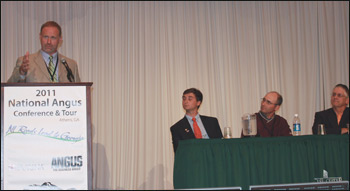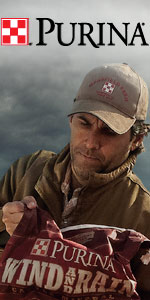Transition Planning Necessary for Industry Future
ATHENS, GA (Sept. 6, 2011) — A three-person panel moderated by Curt Lacy, livestock economist and associate professor at the University of Georgia (UGA), offered insight and tips for transitioning the farm from generation to generation.

Curt Lacey, Scott Bennett, Don Schiefelbein, and Tommy Maples
Lacy; Scott Bennett of Knoll Crest Farm Inc., Red House, Va.; Don Schiefelbein of Schiefelbein Farms, Kimball, Minn.; and Tommy Maple, of Maples Angus Farm, Elkmont, Ala., shared their personal experiences in the challenges of transition planning.
Planning needs to take place early, Lacy advised, because poor planning can put families in trouble. Recognizing that family and money are two of the most sensitive topics families can discuss, Lacy suggested seven major considerations for transition planning.
• Is there a clearly focused goal?
• Whom does the transfer impact?
• Is the farm profitable today?
• How do you fairly treat participants and nonparticipants?
• What is the correct entity?
• Do you maintain one unit or divide?
• Do you have a firm buy-sell agreement?
The youngest panelist, Bennett, 22, is a fourth-generation farmer. He offered four main pieces of advice from his experience with his father and two uncles: (1) The farm can always be family time, but family time should not always be farming. (2) A family is a team effort, so the business should be, too. (3) It is important to know each other’s interests and strengths and to embrace them. (4) Have faith in God and support each other.
Bennett said that support for each serves as a checks and balances system so, “no ego ever gets too big and no extreme decisions are ever made. Slow-and-steady, conservative business decisions works for us.”
Schiefelbein shared a unique and successful business plan that works for his large family. The finalized business plan took about a year to construct, but he offered the rules and guiding principles that went into its creation. His father’s two major rules for all nine brothers were that everyone must leave the ranch for at least four years and that all business meetings were for operators only.
The business plan set protocol for asset transfers and management transfers, and defined the “what If’s,” which Schiefelbein said needed to happen before the estate transfer. An example of a “what if” is at 37, he discovered he had a heart condition and needed a pacemaker.
He said to make the business plan, the group agreed to five guiding principles. They concluded that fair vs. equal would be determined in various operations, the operators have control, the tax understanding to minimize tax burden, the structure of three organizations within the farm, and the unselfish rule that the ranch’s success was the first priority.
Maples’ farm has had a long history and has been in his family since 1818, a year before Alabama became a state. His children are the seventh generation on the farm, so it is in his best interests to properly transition the estate. His family’s method is a gradual process, his parents and he and his wife run the farm. All of them run it together, though Maples said his father decides what he does and does not want to do on a daily basis.
He said that he started to take over the books from his father, especially because his wife is a certified accountant. When breed records became electronic, Maples began taking care of the recordkeeping, too. Gradually, when his father decides that he doesn’t want to farm anymore, then Maples will have full control of the farm.
Because Maples works so closely with his parents, he says, “You’ve got to really love the people you’re working with.”
He said he maintains the farm so he can pass it on to his children, who have grown up with a love of the farm and of agriculture.
Editor’s Note: The articles used within this site represent a mixture of copyrights. If you would like to reprint or repost an article, you must first request permission of Angus Productions Inc. (API) by contacting the editor at 816-383-5200; 3201 Frederick Ave., Saint Joseph, MO 64506. API claims copyright to this web site as presented. We welcome educational venues and cattlemen to link to this site as a service to their audience.


